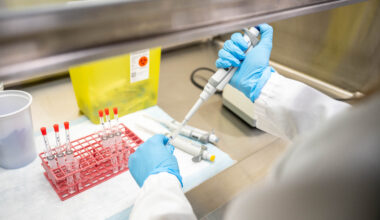“In the beginning, we were just thinking about children, and how education affects kids’ brains,” said Dr. Lara Boyd, one of the original principal investigators with the Educational Neuroscience and Healthy Child Development Research Cluster. “Now our cluster has grown to four or five times its original size and we’re widening our original scope.”
The group has added important faculty perspectives on education, including Dr. Claudia Krebs, who offers an essential point-of-view on the role of technology in educating students in a postsecondary environment. Dr. Krebs has been adapting technology to provide a more comprehensive learning experience for doctors-in-training; she is currently teaching medical students about chronic pain in an immersive virtual-reality setting that is particularly notable for its focus on empathy.
“We can already see that Dr. Krebs’ efforts in compassionate education are changing students’ brains as they learn about chronic pain in a more comprehensive way,” said Dr. Boyd. “Dr. Krebs is teaching empathy, and through our collaboration we can quantify her efforts. We can see that teaching students how people are feeling is changing the way that they absorb clinical information.”
Beyond the Faculty of Medicine, the team has engaged interdisciplinary partners across campus to study the way the brain changes as kids learn, as they participate in physical activity, and even as they sing. A highlight of the cluster is a partnership with the UBC School of Music, a Peter Wall Institute-funded project to study how opera training reshapes the brain and alters an individual’s ability to learn, remember, and focus.
Related:
- New multi-faculty research initiative weaves notes and neurons
- Research clusters promote collaboration within and beyond neuroscience at UBC
In the weeks ahead, the cluster is preparing to celebrate its first milestones with a conference on November 15, including a public talk from Dr. Richard Davidson, neurologist focused on the neural bases of emotion and emotional style. In addition, they look forward to bringing educational neuroscience dialogue into the community with a public lecture series in East Vancouver, beginning November 21.
EVENTS
- Innovations in Educational Neuroscience: Transforming practice through emerging research (November 15)
- Well-being is a skill that can be learned: An evening with Dr. Richard Davidson (November 15)
- After this talk your brain will not be the same: Adventures in Neuroplasticity (November 21)
“Our first year was about relationship-building and establishing connections across campus,” said Dr. Boyd. “Our second year is going to be about putting those relationships to work.”
As the cluster moves forward, they’ve emphasized bringing in perspectives outside the laboratory environment. The team is assembling advisory boards, including one with kids aged 8 to 13 years and an adolescent board based out of University Hill Secondary at the University of British Columbia.
“There is incredible interest from the UBC community—and the international neuroscience and education communities as well—in how education changes the brain,” said Dr. Boyd. “And as we move forward, we’re finding that our questions are very complex. And that’s great, because it means in order to tackle these questions in the right way we need to cross-train our partners and really engage students, teachers, and our communities.”
For more information on the Educational Neuroscience and Healthy Child Development Cluster, visit educational-neuroscience.ubc.ca or email edu.neuro@ubc.ca.


